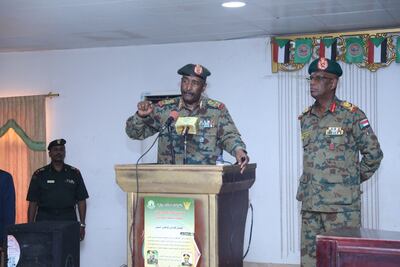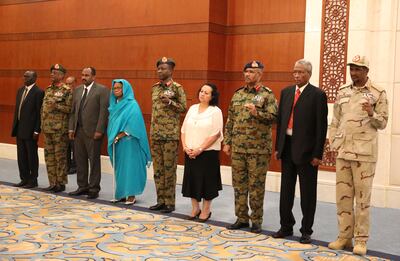Sudan said on Tuesday that it had thwarted an attempted coup by army officers and civilians loyal to the regime of ousted dictator Omar Al Bashir.
Prime Minister Abdalla Hamdok said the aim was to derail Sudan's transition to democratic rule two years after Al Bashir was removed by the military in the face of mass street protests.
“But our resolve was stronger and going back is impossible,” he told the nation in a televised address.
Separately, the military said in a statement that "most of the coup participants" – 21 officers and an unspecified number of troops – were arrested and that all positions taken by them were recaptured.
"The search and investigation are ongoing to capture the remainder of those involved," the military said.
It also published images of head of state Gen Abdul Fattah Al Burhan visiting the sprawling Al Shagara barracks on the outskirts of Khartoum, where the plotters are believed to have served.
Defence Minister Gen Yassin Ibrahim identified the coup leader as Lt. Gen Abdul Baqi Al Hassan Othman. He told reporters that he and 22 officers of various ranks and a number of soldiers he did not specify were behind the attempted coup.
He said the coup was swiftly foiled without casualties or material damage.
The latest attempted coup underlined the fragility of the transition to democratic rule in a country where elected governments and the military have vied for power since independence in 1956.

Army generals seized power from civilian governments in 1958, 1969 and 1989, giving the military more than 50 years in power. Beside those three successful coups, Sudan has experienced at least two dozen failed coups, some of them involving bloodshed.
Earlier on Tuesday, Information Minister Hamza Baloul sought to reassure the Afro-Arab nation that all was in hand.
“We assure the Sudanese people that the situation is fully under control,” Mr Baloul said in a live broadcast on state television. “The civilian and military leaders of the coup attempt have been arrested.”
He said army troops “liquidated the last coup pockets” in Al Shagara barracks.
“The relevant authorities are continuing to pursue the remnants of the vanquished regime who took part in the failed coup,” he added, without giving more details.

Mr Hamdok's later comments came during a joint meeting of his government and the Forces of Freedom and Change, a pro-democracy alliance which mobilised the street protests against Al Bashir in April 2019.
“The unity of the forces of freedom, revolution and change is both the guarantee for and immunity of a civilian and democratic transition; and realising the objectives of the revolution,” he said.
“The attempted coup requires a full and transparent review of the transition to arrive at a partnership based on the slogans and the principles of the revolution as well as a road that leads only to a democratic and civilian transition.”
Early on Tuesday, state radio and television interrupted regular programming to broadcast patriotic songs as hundreds of troops and tanks took to the streets of the capital.

The plotters failed in their attempt to take over the state media building, a military source told The National.
They said a general from the armoured corps had planned to enter there to broadcast an announcement of a coup but was prevented by other elements in the military.
The source said the incident came after months of rumours.
“Such rumours are being recycled every now and then to destabilise state-building,” the source said.
The state TV and radio building, in Khartoum's twin city of Omdurman, has routinely been the first target of coup attempts.
Troops and tanks briefly closed the White Nile bridge linking Khartoum and Omdurman.
Military policemen were out across the city, but life in Khartoum appeared mostly normal by mid-morning.
In a telephone interview with The National, an army general and a Cabinet minister also blamed the coup attempt on Al Bashir loyalists.
In a Facebook post, Sovereign Council spokesman Mohammed El Faky Suleiman urged the Sudanese to “rise up and defend your country and the transition” .
Pro-democracy activists complained that not enough was being done to purge Al Bashir loyalists from the military, police and security agencies. Many of the military's top brass and mid-ranking officers are known to be sympathetic.
Mr Hamdok's civilian-led government made the error of not having the upper hand in restructuring the military and security services, Samir Makeen, the deputy head of the National Commission of Human Rights, told The National.
“The constitution does not give this authority to the civilian government and the military has been dragging its feet over doing the necessary purges,” Mr Makeen, who is also a lawyer and human rights activist, said.
Mr Makeen resigned on September 12 to protest against what he described as the commission’s failure to make any tangible progress on human rights over the past two years. The commission has yet to accept his resignation.
The army ranks were filled with the remnants of the Al Bashir regime, Mr Makeen said. “We are not talking here about the rank and file,” he said. “We are talking about senior officers who call the shots.”
Minister of Religious Affairs Nasredeen Mofreh Ahmed condemned what he described as an attack on the nation's fledgling democracy.
“The enemies of the country and the glorious revolution are trying to abort this great national project,” Mr Ahmed said in a statement. “But we will, just as the revolutionary forces will, remain alive; and the attempts of the corrupt remnants of the vanished regime will be to no avail.”
The coup attempt came as the government grapples with a surge in street crime in Khartoum, which has prompted the authorities to send thousands of police and troops on to the streets.
The crime wave has compounded the difficulties of most Sudanese, who are struggling to cope with rising prices.
Mr Hamdok blamed Al Bashir loyalists for the sharp rise in crime as well as acts of sabotage in the capital and elsewhere, saying they were part of the preparations for Tuesday's foiled coup.
The military and civilian components of Sudan's transitional administration have also been at loggerheads. Each accuses the other of breaches of authority and being the cause of some of the country's woes.
Mr Hamdok's mention of the need to establish a new basis of “partnership” appeared to be a reference to the differences between the military and the government.




